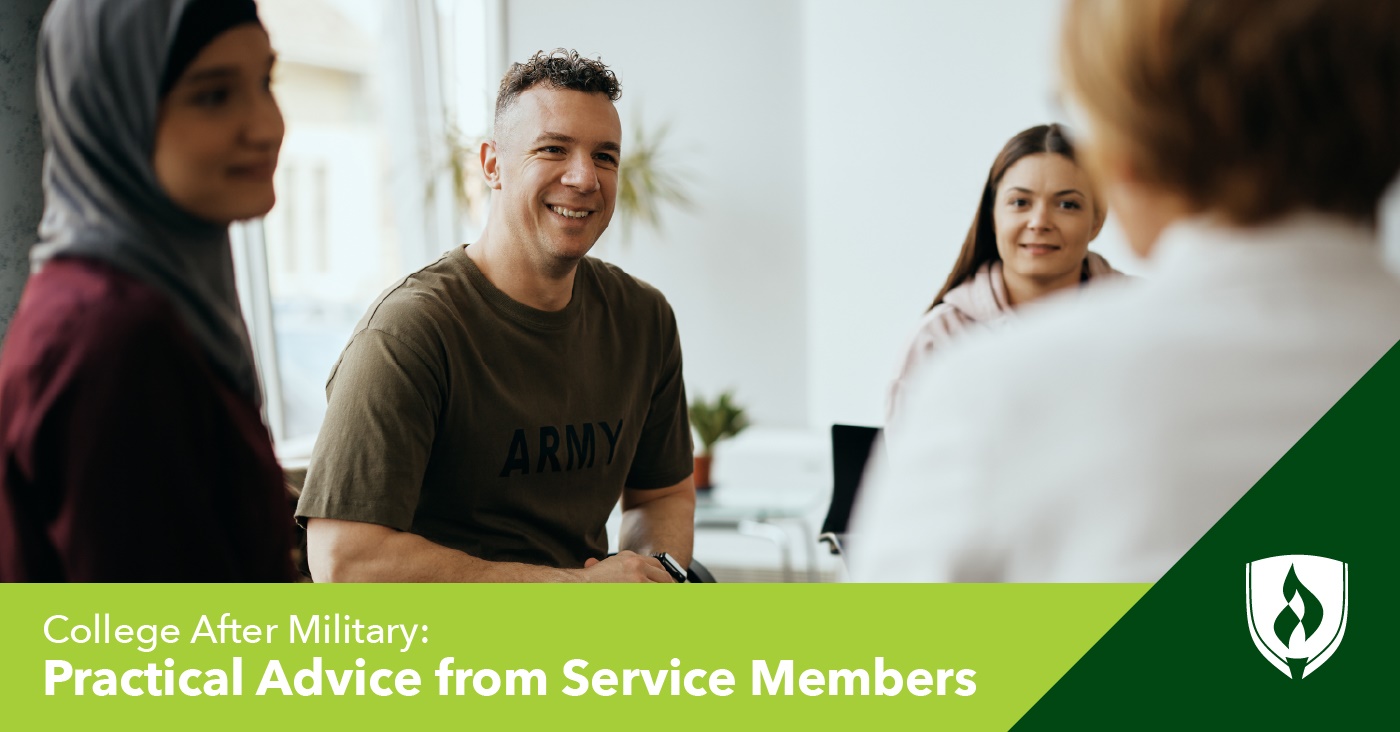
You’ve undoubtedly faced some formidable challenges while serving in the military. No matter how daunting an obstacle seemed, you always found the inner strength to overcome and continue pushing forward.
Now you’re considering facing a different type of challenge: attending college. Making the transition to college life comes with ups and downs for everyone, but veterans and service members often have unique circumstances that they need to consider as they prepare for college after military life.
But you’re not alone in this process! Plenty of service members have gone before you in attending college after the military. We’ve rounded up advice from service members who’ve attended college so you can feel prepared for your next big step of earning a degree.
Is going to college after serving in the military worth it?
While that’s obviously a huge question and one that only you can answer, we can give you some thoughts to consider.
For one, you’ll want to think about what the next phase in your life will ideally look like and do some self-reflection. Are you looking to work in an office environment? Stay physically active at work? How confident are you in your academic ability? Do your military training and experience translate well to another role? How many years would you want to commit to attending school? The answer to these will all inform whether attending college after military service is the right choice for you.
Just as military service can change the direction of your life, so can college. The degree you earn can influence your career path and help you grow as a person. If the career you envision yourself in calls for a degree and the career path has a strong outlook, it may be worth pursuing the required degree.
While you’ll have a lot of questions regarding potential career and educational paths to weigh, your military experience can potentially be a big help with managing a huge factor for most students—the cost of going to college.
Tuition and the expenses associated with going to college may seem intimidating, but as you likely know by now, military education benefits like the GI Bill® can help make the cost manageable. Though there have been several iterations of the GI Bill over the years, generally speaking, the program provides money to help service members cover the costs of college or other employment training programs. Other military education benefits you may be eligible for include:
- Tuition assistance: Tuition payments funded by the individual branches of the military for members currently serving
- Top-Up Program: Benefit offered on top of tuition assistance that helps service members whose GI benefits don’t cover all of their education costs
Sorting through these potential options and the eligibility requirements associated with them may seem like a lot to navigate on your own, but military specialists at the institutions you’re interested in can often help you find the best options for your situation.
Practical advice from service members on attending college after military service
If you do decide college is the right next step for you, it’s never a bad idea to learn from those who have walked the same path before you. We’ve asked college graduate veterans to offer their advice to anyone making the transition.
1. Don’t worry about feeling “behind” your peers
Many former service members may feel like they’re “behind” other students since many of their classmates are fresh out of high school. “My biggest challenge was that I was 27 years old and felt like I was behind others by starting at this age,” says veteran and author Carol Gee. “I had this feeling that I needed to catch up.”
However, this feeling is often unfounded. Gee, who attended college on a military base while her husband served in the Air Force, discovered that many of her classmates were older than the typical college student. “After enrolling, I realized I wasn’t the only older student just beginning. In fact, there were many who were even older,” Gee says.
That’s not just one anecdote being the exception, either. Enrollments of “nontraditional” students have grown substantially in recent years. In fact, enrollment of students 25-to-34 years old increased 41 percent between 2000 and 2017, according to the National Center for Education Statistics.1 You can rest assured that no matter your age, it’s never too late to pursue an education.
2. Choose the environment you need
Not all college environments are the same. Every college campus has a different atmosphere, and many degree programs can be completed online. Anthony Treas, a veteran of the Iraq War who went on to earn bachelor’s and master’s degrees and start STRONG Men Coaching, recommends finding a college environment that suits your needs.
“For the first two years after my deployment, I took only online classes. During this time, I was struggling with PTSD severely, and I did not feel comfortable being around a lot of people,” Treas says. After two years, he found a university campus that offered the right environment, programs and resources he needed to succeed.
“For veterans who may also be struggling with PTSD, I would encourage them to visit the campus they are thinking of attending,” Treas says. Visiting potential colleges in person will help you choose one that offers the right atmosphere for you. While you might find one that’s a great fit, you may also want to consider online courses.
3. Consider a shorter degree program
Many people envision a four-year commitment when they talk about college, but that doesn’t have to be the case. Many degree programs are designed to help you enter the workforce in less time, which can be helpful for service members eager to get started on their new career.
Because Gee was still working around the schedule of her enlisted husband, she decided to choose a two-year degree program. “That way [if we had to relocate], I didn’t have to worry that some of my credits wouldn’t transfer and I would have to retake them, wasting time and money.”
4. Connect with other veterans
Being a veteran in a college setting can feel isolating. While other students are focused solely on their studies, veterans may also be struggling with adjusting to civilian life in a way that most students can’t relate to.
“What helped me was finding other veterans on campus,” Treas says. “At the college I attended, there is a veterans’ lounge and a very active veterans’ group that would meet on a regular basis. Having other veterans to talk to and become friends with helped in dealing with this transition.”
Lt. Col. Jerry Quinn, chief operating officer of the American Armed Forces Mutual Aid Association®, acknowledges that veterans can sometimes struggle with finding a new purpose after services. He recommends searching for other sources of community to help them discover new interests. “Taking steps to actively seek out activities and networking opportunities during your time in school is an easy way to find what interests you, make a difference and grow your social circles all in one.”
5. Share your experiences
It can feel intimidating to sit in a classroom where no one else shares your experiences. “The most difficult transition for me was attending classes with students who were mostly unaware of some of life’s difficulties and what was going on in the world,” Treas says. “It was difficult to relate to the students.”
He was able to turn this uncomfortable situation into a positive one by using his time in the classroom as an opportunity to talk about his experiences with other students. “I took the attitude that we can learn from each other, and I found most students were open to hearing what I had to say when given the opportunity.”
6. Use any available resources for former service members
There is an abundance of resources available to help service members navigate the transition from military life to college. The veterans we spoke to encourage every vet to take advantage of these options.
“For veterans anticipating attending college post-military, I recommend that they work closely with a veterans’ counselor at their select colleges,” Gee says. Working with her counselor led her to realize that some of her military training could count toward elective credits, which allowed her to save time and money.
There are also plenty of options available to make the cost of college tuition more affordable for veterans. “I would encourage all veterans to take advantage of their educational benefits, especially Vocational Rehabilitation and Employment (VR&E), for those who qualify,” Treas says. Veterans’ counselors and other staff can help you apply for and maintain requirements for benefits like VR&E and the GI Bill, so don’t shy away from claiming them if you want to earn a degree.
7. Don’t wait to pursue your education
“I would encourage veterans to go to college early on,” Treas says. “I know the struggles of returning from war and dealing with PTSD and many of life’s difficulties.”
He adds that overcoming these obstacles to pursue your education is often better than waiting.
“My degrees and being a war veteran have opened many doors for me. I now get to do something I love, rather than something I must do or am not happy doing. I help men achieve better health, happiness and personal fulfillment,” Treas says. He acknowledges that this wouldn’t have been possible if he hadn’t prioritized his education, even when it was difficult.
Find success in college after military
Preparing for college after military service can feel intimidating, but this advice from veterans who have stood in your shoes can help you make the transition. Using the discipline and other skills you’ve gained in the military can make succeeding in college easier. Check out additional info about the role of a military nurse.
Rasmussen University offers plenty of resources for service members to take advantage of as they pursue their degree. You’ve served your country—now let us serve you. To learn more about how Rasmussen University can help you take the next big step in your life after serving, visit the military benefits page.
1William Hussar and Tabitha Bailey “Projections of Education Statistics to 2028” National Center for Education Statistics. May 28, 2020. [accessed April 2022] https://nces.ed.gov/programs/PES/section-5.asp
GI Bill is a registered trademark of the Department of Veterans Affairs.
American Armed Forces Mutual Aid Association is a registered trademark of Army and Air Force Mutual Aid Association.




